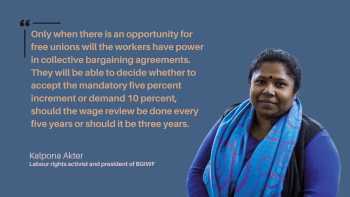What's stopping RMG workers from getting higher wages?

One of the driving forces of Bangladesh's economy, the ready-made garment (RMG) sector, is again on the news. On November 7, the wage board formed by the government announced RMG workers' minimum wage to be Tk 12,500 per month, an increase from the Tk 8,000 fixed in 2018, which was nowhere near the workers' demand of Tk 23,000. Unsurprisingly, workers took to the streets to reiterate their demands for high wages. But in an unfortunate turn of events, the demonstrations faced backlash from authorities, which led to four workers being killed and scores being injured after clashes with police.
At a time when low-income households are struggling to make ends meet—amid skyrocketing prices of essentials—such a reaction points to a complete lack of empathy. The last 18 months saw sky-high inflation. As per Bangladesh Bureau of Statistics (BBS), the general point-to-point inflation rate reached 9.93 percent in October 2023, as opposed to 8.91 in October 2022. Food inflation rose to 12.56 percent in the same month. The item-wise daily prices published by the Trading Corporation of Bangladesh paint a grimmer picture, as inflation of some essentials' prices have been as high as 20 percent during the past months.
The violence centring RMG workers' protests broke out when a mission from the EU was visiting Dhaka (during November 12-16) to review the implementation status of the labour sector's National Action Plan. Ahead of Bangladesh's graduation from the least developed country (LDC) status in 2026, the EU wants to see stronger worker safety and full compliance with international labour standards in RMG factories, so that Bangladesh can continue to enjoy the benefits of Everything but Arms (EBA) and Generalised System of Preferences Plus (GSP+) even after its LDC graduation.
The recent violence and its management is worrisome, and the observations of major importing countries, like the EU and US, in this regard should be seriously considered. Bangladesh is already under the radar of many western countries, particularly the US, in connection with holding a free, fair, national election in January 2024. The situation can certainly get worse if the labour rights issue is not duly addressed. The resultant impact will have a knock-on effect on the overall economy.
In FY 2022-23, Bangladesh's apparel export to the EU market was $23.5 billion, about 50 percent of its worldwide apparel exports. On several occasions, the EU has clearly mentioned that to continue exports, the sector has to comply with labour, political and environmental standards.
Meanwhile, the US has expressed grave concerns over the violence against workers and criminalisation of trade union activities. It has now launched the Presidential Memorandum for advancing workers' rights at home and abroad. As part of this new policy, the US administration can impose sanctions, trade penalties and visa restrictions on those who violate labour rights. Even though it does not provide GSP facilities to Bangladeshi apparel exports, the US is the single largest market for Bangladeshi apparels. In FY2022-23, Bangladesh exported over $8.5 billion worth of apparel to the US, which was over 18 percent of the total apparel exports of Bangladesh to the world, according to BGMEA data.
Global concerns about Bangladesh's RMG sector are due to the fact that international buyers and consumers are part of the industry. Hence, in the aftermath of the Rana Plaza collapse in April 2013, brands and buyers took proactive steps to collaborate with suppliers and improve compliance. Initiatives—such as the Accord on Fire and Building Safety, and Alliance for Bangladesh Worker Safety, and Partnership for Cleaner Textile—were rolled out through partnerships with Bangladeshi entrepreneurs, aiming to address the overall situation.
While compliance during that period has helped to bring more credibility to the RMG sector, this is not a one-off initiative but an ongoing process. While many RMG owners have accepted compliance as an integral part of their business to survive, compliance also includes workers' welfare, freedom of expression and freedom of association to voice their demand. Unless a holistic approach is taken, the sector will continue to fall short of international standards.
Replying to the protests, factory owners think the newly-announced wage is justified, and any further increase will push them out of business. For reasoning, they highlight power and gas shortages, high cost of raw materials, dollar crisis, fall in consumer demand in the West, and the overall high cost of production. Exporters claim that they supply at rock-bottom prices amid a race to the bottom. Additionally, they have to comply with various requirements, such as greening factories and the supply chain.
While expressing their concerns, the factory owners, however, do not acknowledge the various kinds of support given to RMG exporters in Bangladesh. For example, the government offers a five percent cash incentive to exporters who manufacture garments using locally-sourced raw materials like yarn and fabrics. An additional four percent incentive is extended if their products are shipped to non-traditional markets, excluding Canada, the EU, and the US. RMG exporters also benefit from an extra one percent incentive applicable to all countries. However, the owners claim that these incentives do not bring them many benefits, and that the buyers offer a low price as they know that Bangladeshi exporters receive certain incentives.
Therefore, the increase of minimum wage in the RMG sector is a multi-stakeholder issue. While the wage board is composed of government officials, representatives of factory owners, and workers, the government often fails to consider workers' welfare and favours the owners. But if the government can encourage exporters with various cash incentives, it can surely also provide some support to the workers, who are equally contributing to the export earnings from the RMG sector.
The recent violence and its management is worrisome, and the observations of major importing countries, like the EU and US, in this regard should be seriously considered. Bangladesh is already under the radar of many western countries, particularly the US, in connection with holding a free, fair, national election in January 2024. The situation can certainly get worse if the labour rights issue is not duly addressed. The resultant impact will have a knock-on effect on the overall economy. The RMG sector plays a pivotal role in our export portfolio, accounting for 84.6 percent of total export income in FY 2022-23. Presently, the sector provides employment to over 4.5 million workers.
The large factories are investing in safety and technological upgrades. Indeed, this is the way to tackle increased costs of production and ensure productivity. Training of workers, particularly women workers, should be an integral part of this process. But even after all this, wages need to increase. Higher costs on account of wages in the short run can in fact be internalised through higher productivity in the medium to long run. In fact, in the era of the fourth industrial revolution, there is no other way but to go for automation to remain competitive. And, if an industry is not competitive, it cannot survive. Such an industry should also not be supported forever just to keep it alive.
But relatively smaller factories may find it difficult to raise wages. This is why workers' wages should be a shared responsibility. Brands and buyers should also contribute towards increasing RMG workers' wages by offering better prices to Bangladeshi RMG exporters. Unfortunately, in a competitive market, brands and retailers seek the lowest prices and to maximise profits. But ethical buying and fair prices should be a part of businesses' own compliance policy. Civil society organisations and the media can play an important role by acting as a watchdog for compliance, including ethical buying.
We often hear that buyers fear that if they purchase apparels at higher prices, the workers may not get a share from this. In that case, buyers could directly deposit the additional money to the workers' account/s.
There exists a trust deficit among the government, factory owners, and RMG industry workers. Regular dialogue including all stakeholders is crucial to minimise this trust gap. Workers should be able to express their demands without fear. This will also lend some transparency to various processes including wages and labour rights in the sector.
Dr Fahmida Khatun is the executive director at the Centre for Policy Dialogue and non-resident senior fellow of the Atlantic Council.
Views expressed in this article are the author's own.
Follow The Daily Star Opinion on Facebook for the latest opinions, commentaries and analyses by experts and professionals. To contribute your article or letter to The Daily Star Opinion, see our guidelines for submission.

 For all latest news, follow The Daily Star's Google News channel.
For all latest news, follow The Daily Star's Google News channel. 











Comments